Is Machiavelli a Modern ?
The Statecraft of Machiavelli. By H. Butterfield. (Bell. 6s.)
IN common with most influential political thinkers, Machiavelli failed to evolve a political philosophy which was all of a piece. When later commentators seek to card-index his opinions and to reduce his diversity to a tidy system, it inevitably turns out that certain aspects have to be omitted because they will not fit into the preconceived picture. The main purpose of Mr. Butterfield's acute little monograph is to draw attention to some of the points commonly excluded in our current estimates of Machiavelli. Every now and then his comments have a slight, though not unpleasant, flavour of debunking. He would have us believe that Machiavelli is not really so " modern," not really so much of a realist, as we are apt to pretend, and that there is a good deal of justification for the common sixteenth and seventeenth century view of him as an artful dodger.
Mr. Butterfield's strongest and most original point is his insistence on the way in which Machiavelli always measures the contemporary world by standards of classical antiquity. The contemporary Italian breaks down because he is not an ancient Roman ; and to recover the merits of ancient Rome is the key to political salvation. (One gets an occasional present-day echo of this attitude in some of Signor Mussolini's allocutions.) While, therefore, Machiavelli prides himself on seeing men as they are, and while he has often been acclaimed as the founder of the inductive method of political thought, what he does is something quite different. He derives political maxims from the writings and practice of classical antiquity, and holds them up for the guidance of sixteenth century Italians—an a priori process if ever there was one. In this respect, he is less inductive and less modern than Guicciardini, who shows far less dogmatism in the application of fixed principles to given situations.
There is much truth and much value in this criticism. But Mr. Butterfield tends to exaggerate it by making insufficient allowance for the political idiom of the Renaissance period. Machiavelli lived on the wrong side of the watershed which divides those who think (whether they realise it or not) in terms of progress from those who do not, those who seek their golden age in the future from those who find it in the past. It was an essential assumption of Renaissance thought that classical antiquity represented—not relatively, but absolutely—the highest point of human achievement ; and in this sense it was a priori and static. Machiavelli inevitably wears an old-fashioned look in an age of dialectical materialism.
Where Machiavelli is, however, most original and most modern is in his attempt to treat politics as an ethically neutral science, not as a branch of ethics. There is an element of technical efficiency in politics which is as independent of moral considera- tions as are the qualities of a high explosive. Writing at what appeared to be one of the crises of civilisation, Machiavelli per- ceived—as men have perceived at other moments of crisis—that " he who neglects what is done for what ought to be done sooner effects his ruin than his preservation " ; and he hammered into the consciousness of his contemporaries, in what was perhaps a deliberately shocking and provocative way, the unwelcome truth
that at such moments ruthlessness is more effective than pious sentiments. The greatness of Machiavelli is that he saw a part, though not the whole, of the truth about politics with unrivalled penetration. His tragedy is that those who least need to learn from him make him their bible, and that those who need him most can seldom stomach a doctrine so pungent and so merciless.
E. H. C.ARR.


























 Previous page
Previous page